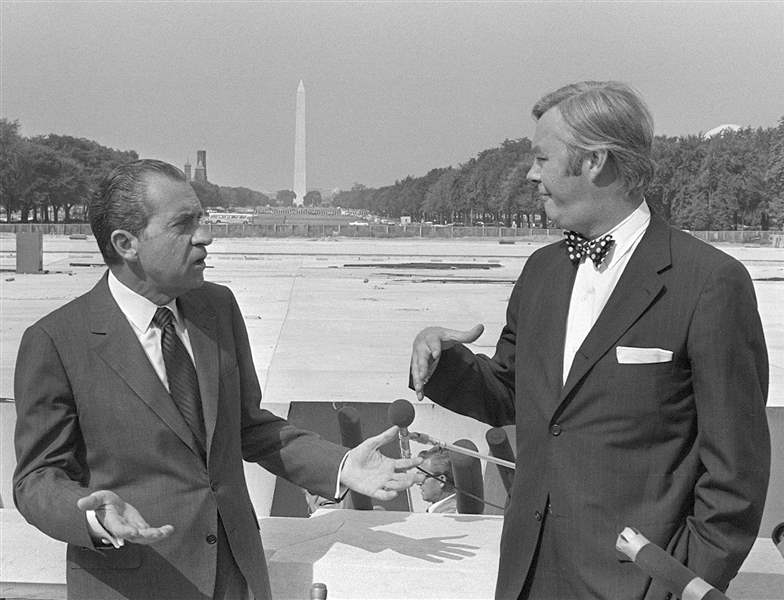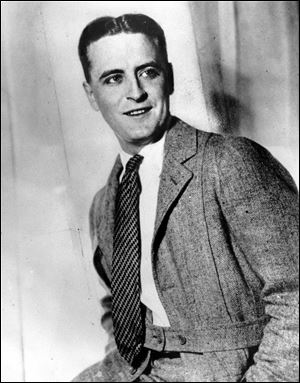
Busting out of the binary box
2/9/2018
Daniel Patrick Moynihan and President Richard Nixon, left, had vastly different visions of America but were able to find common ground for the good of the country.
ASSOCIATED PRESS

Keith Burris.
The immigration stalemate in Washington is a case study in what ails us.
The Democrats and the Republican agree about little on immigration. But they do agree on one big thing: Saving the Dreamers. Yet they cannot get it done.
Why?
I think because we’re stuck in binary thinking — the notion that we have only two choices at all times; only two paths. And maybe only two truths.
When we are in the binary box the resolution cannot come from a classic compromise, in which the difference, like the baby saved by Solomon, is split.
We are not talking about yardage here, but different pictures of the world.
To escape the box, the difference must actually be cherished; lived in. We have to understand each other, just a little, and be OK with disagreeing with each other.
Once upon a time, Americans were good at this. William F. Buckley ‘s best friend was John Kenneth Galbraith. They agreed about nothing but skiing and wine. My Dad’s best friend was Bill Timmons who thought Roosevelt ruined the country. Dad believed he saved it. They saw nothing eye to eye.
We have to get comfortable with gray again; with a lack of ultimate resolution. To be happy with just a little common ground. Suppose, as a start, that the immigration restrictionist were to admit that this nation was built by immigrants? Suppose the immigration expansionist were to assert that the modern, high tech economy requires more immigrants with specific knowledge and gifts?
But they can’t get to policy common ground without a loosening of the binary mentality.
And to do that, we need directional thinking — in which we do not try to settle the debate or even reconcile two world views. We simply look for a way to move forward one step at a time — accepting the contradictions.
If you are “right to life,” a “woman’s right to choose” is nonsensical. And vice versa.
But what if both things are true? Even though they seem contradictory. Thus, a fetus might indeed be seen as a viable human life from the earliest stage of development and have a right to exist, while a woman’s moral choices might properly be seen as private matters.
The question becomes not “who’s right?” but “can we see some of each others’ truths”?
A friend said a brilliant thing to me recently. He said no one would accept exclusively binary choices in medicine: You are either dying or there is nothing at all the matter. You either take chemo or drink green tea and chant. Nothing in between.
The notion should be seem equally absurd when we think about the country. Political and governmental problems don’t always call for one of two same medicines: Always more government or always less. After the stock market crash in 2008 we needed some new and specific banking regulation and a bailout for the auto industry. We need something very different today.
Not every public choice requires directional thinking. Some choices are binary. But most are directional and many are complex, meaning that two things that might seem to be in contradiction are both true.

F. Scott Fitzgerald believed that understanding opposing views was the mark of true intellect.
F. Scott Fitzgerald said: “The test of a first-rate intelligence is the ability to hold two opposed ideas in mind at the same time and still retain the ability to function.”
What if the Great Society was a needed thing in 1965 but an ever-growing welfare state and the proliferation of poverty “professionals” has been a mistake since?
What if Truman did end the war by dropping the bomb but he still ought not to have dropped it?
What if Barry Goldwater wasn’t the right man to be president in 1964 but was also not crazy, as the media said then, and was actually an honest and honorable man?
History reveals many past binary choices to have been false ones.
We cannot think outside the box if we censor for thought crimes.
And we cannot think at all if we are always stuck in the binary bind.
How to escape it?
We must be able to recognize the fundamental validity in a competing vision.
Daniel Patrick Moynihan left us a paragraph that contains in its few words more wisdom than the last 30 years of American political commentary in total. He said: “The central conservative truth is that it is culture, not politics, that determines the success of a society. The central liberal truth is that politics can change a culture and save it from itself.”
Pat Moynihan and Scott Fitzgerald would have been great chums
Keith C. Burris is editorial page editor of The Blade. Contact him at kburris@theblade.com or 419-724-6266.